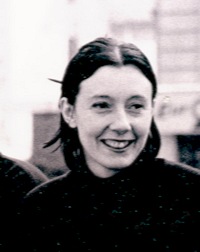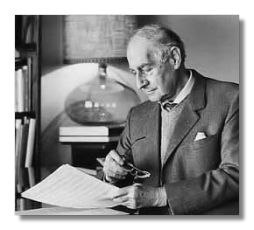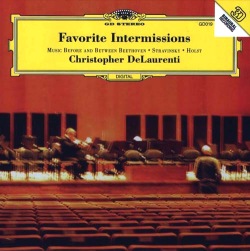 The big news in London this weekend is a £1 million (almost $2m) tie-up between English National Opera and Sony PlayStation to put games consoles into the foyer of the hallowed London Coliseum. This is an opera house renown for its shock tactics, as the production shot from their Don Giovanni here shows. Of course, anything to reach a new audience must be praiseworthy. Or must it? On An Overgrown Path isn’t so sure, and also has the full story.
The big news in London this weekend is a £1 million (almost $2m) tie-up between English National Opera and Sony PlayStation to put games consoles into the foyer of the hallowed London Coliseum. This is an opera house renown for its shock tactics, as the production shot from their Don Giovanni here shows. Of course, anything to reach a new audience must be praiseworthy. Or must it? On An Overgrown Path isn’t so sure, and also has the full story.
Our regular listen to and look at living, breathing composers and performers that you may not know yet, but I know you should… And can, right here and now, since they’re nice enough to offer so much good listening online:
Cecilia Arditto (b. 1966 — Argentina / NL)
 Cecilia will tell you:
Cecilia will tell you:
I have always been struck by the sensuality of sound, I have always loved it. The infinite possibilities of instruments constitute a source of inspiration and research. However, the exploration of sound would just be an empty category, a cosmetic idea, if it were not tied to the idea of musical grammar. Here, then, is an introduction to my research: intense exploration of the world of tone-colour – principally of acoustic instruments and the human voice – subordinated to a profound preoccupation with the idea of form. For me form is conferred only by a few elements, by small points. They could be few in number and minimalist; complexity is not a matter of quantity. […]
Musical works transcend the various performances and their historicity, they transcend the composer’s intentions. Music resonates at a historical moment, but also in the most intimate categories of a human being: it resonates in places you cannot grasp, that can only be suggested, that can only be guessed at through a delicate network of relationships. Music is neither notes nor instruments, nor is it time. It constitutes an object that is impossible to define, that gives rise to a multiplicity of simultaneous perspectives. The essence of a musical work is given by the listener. This essence propulses the music into a more abstract condition. […]
I think music has to do with several things at the same time: feelings, thoughts, perceptions that are always changing. I cannot say, “That’s how it is!”. So I cannot answer your question. It is when I write music that I find what I am looking for.
At her site you’ll find the rest of this 2004 interview, along with many MP3s and scores. There’s also a link to her (Spanish-mostly) blog, “La cocina de Ce”.
 Gian Carlo Menotti died today at a hospital in Monaco. He was 95. In the days before television became a total waste of time, NBC commissioned him to write the first opera specifically for the new medium. For many years, Amahl and the Night Visitors was played every year at Christmas and it introduced millions of people, including me, to the idea of opera. I haven’t heard it for years and thus have no adult opinion of whether it is good or not but it was a very good thing for NBC and Menotti to have done.
Gian Carlo Menotti died today at a hospital in Monaco. He was 95. In the days before television became a total waste of time, NBC commissioned him to write the first opera specifically for the new medium. For many years, Amahl and the Night Visitors was played every year at Christmas and it introduced millions of people, including me, to the idea of opera. I haven’t heard it for years and thus have no adult opinion of whether it is good or not but it was a very good thing for NBC and Menotti to have done.
The County Museum of Art didn’t cancel all serious music: just the Monday Evening Concerts. Under new management, the music program now offers occasional concerts on any night but Monday. They try to relate the bookings and programming to the art. Thanks to one other difference — being willing to do some PR — a good crowd came to LACMA to see eighth blackbird. The ostensible tie-in to the art was with the smashing special exhibition on Magritte and art he influenced. (Unfortunately the museum is closed on Wednesdays so that for the attendees the art was limited to a distracting slide show behind the musicians.)
The six musicians of eighth blackbird gave us a well-chosen program in which some of the works did resonate with the attitudes and approaches of the exhibit. My favorite was by Stephen Hartke, USC professor and composer of this summer’s The Greater Good at Glimmerglass. The program opened with his The Horse with the Lavender Eye (1997). This is a work of four disparate movements for violin, clarinet, and piano. Magritte might well have appreciated the music inspired by history and art images. The first movement, “Music of the Left” has all three played only by the left hands. (The clarinetist was allowed to use his right hand to support the instrument, but the violinist had to perform his pizzicati on the neck of the violin.) The finale, “Cancel My Rhumba Lesson” was inspired by an R. Crumb comic.
Ending the program was Joseph Schwantner’s Rhiannon’s Blackbirds (2006), written for the group and receiving its West Coast premiere. In justaposition of title and performer this was another nice gesture to the exhibition. It’s a very good work. On first listening, this work seemed a story of constant evolution, with shifts of color, rhythm, harmony, volume, texture. The program notes describe use of a palindrome as a key element, but I was too occupied in the moment to get any sense of shape.
The three works in between were by Gordon Fitzell, Carlos Sanchez-Gutierrez, and Gordon Beeferman. Fitzell’s Violence (2001) was, to me, a non-violent meditation. (A sample is available here.) The Sanchez-Gutierrez Luciernagas [Fireflies] (1998) was a mood portrait of flickering lights exemplifying souls of the murdered residents from a now-deserted Salvadorian village. Beeferman’s Reliquary (2005) was inspired by the composer’s going through his grandmother’s attic. This was another work written for eighth blackbird and being given its West Coast premiere.
The group has been selected to serve as music director of the Ojai Festival in two years, and I’m looking forward to hearing their influence on the programs. They have taste as well as talent.
Our favorite techno-geek pianist Hugh Sung has come up with a really neat new way to integrate live music with dynamic imagery, animations, and synchronized video clips, all of which can be controlled by the performing musician directly a simple foot-switch. Think Arditti Quartet meets the Joshua Light Show. (Perhaps too old a reference for most of you.) Hugh calls his system the Visual Recital which seems as good a name as any.
You can catch Hugh’s next Visual Recital live on Saturday night at the Darlington Arts Center, 977 Shavertown Road, Boothwyn, PA
(610-358-3632) or if you can’t make it you can watch this sample clip from “Vernacular Dance No. 1” by S21 blogger Charles B. Griffin:
[youtube]vW4ud9k9-x8[/youtube]
 Philip Glass turns 70 today and it seems to me he is doing so without much of the hoopla that surrounded Steve Reich’s attainment of that milestone a few months back. No mention of the event in today’s New York Times and Google News turns up only a brief note about a birthday concert in Nashville. Underwhelming reaction for a man who is America’s best-known living composer and one whose music is so widely available in so many forms–CDs, films, concerts and so on.
Philip Glass turns 70 today and it seems to me he is doing so without much of the hoopla that surrounded Steve Reich’s attainment of that milestone a few months back. No mention of the event in today’s New York Times and Google News turns up only a brief note about a birthday concert in Nashville. Underwhelming reaction for a man who is America’s best-known living composer and one whose music is so widely available in so many forms–CDs, films, concerts and so on.
Part of the problem, it seems to me, is that Glass had written so much music that critics assume that it must be uneven in quality and, of course, that is certainly true. But, like the work of Martinu, (another busy little beaver) Glass’ seconds are better than most composers’ first.
Whatever it is, Glass is generally undervalued by the critics and music directors and that’s a shame because he has (according to some critics whose work I respect) been doing some of his best composing in years lately. When his new opera Waiting for the Barberians opened in Austin last weekend, the reviews were considerably better than they have been for a long time: “Some of [Glass’s] most agile, vivid music,” wrote Steve Smith for The New York Times, “setting scenes with a genuinely impressive emotional specificity.” Mark Swed said in The Los Angeles Times that “Barbarians is a sad, shocking and painfully pensive story … Glass’s music, commercially successful, long ago lost its ability to shock. But he can still write melancholic, wistfully pensive music — and better than ever.”
Another new Glass opera, Appomattox, will debut next October at the San Francisco Opera.
So, here’s today’s Cafferty File question: Is Philip Glass overrated, underrated, or fairly valued? I want an up or down answer from everybody.
While we’re all sitting around waiting for the big event (Can you guess what day tomorrow is, boys and girls?), let’s talk about movies. I’ve only seen two of the Academy Award nominees–Letters From Iwo Jima, which is almost great and has some haunting, low-key music by Clint Eastwood’s son, Kyle and the alleged comedy Little Miss Sunshine, which is the single most depressing movie I have ever seen and that includes To Live, The Ballad of Narayama and the one about the Guatamalan kids crawling through the sewer across the Mexican border and being bitten by rats and one of them dies.
For some reason, Barbaro’s death touched me deeply. I wrote something about it here.
Last night’s Los Angeles Master Chorale concert in the Walt Disney appeared to be sold out. The only thing that might surprise outsiders was that the advertising had emphasized that the program would be two works that were actually written in the twenty-first century. Oh, it was a good concert!
The two works were by Steve Reich: “You Are (Variations)” which the Chorale premiered in 2004 and performed in New York as part of the Reich birthday party, and the recent “Daniel Variations” for which this was the West Coast premiere. Reich was at the sound controls handling the amplification. “You Are” is a great work, and Grant Gershon makes this a signature piece. I’m pretty certain that most of the singers, all four pianists, and all four marimba/vibes were the same as in the recording. “Daniel Variations” uses similar resources, with a slightly smaller chorus (from 18 to 12) and a much smaller chamber orchestra (from 20 to 7 if I counted correctly), with the same four pianos and marimbas. As has been commented on, the music makes the violin quite prominent, honoring the violinist who was Daniel Pearl. Steve Reich (in his black baseball cap, of course) came down to the stage to join Gershon and the performers and receive the waves of applause and pleasure from the audience.
To complete the concert Grant Gershon gave us an interesting bit of programming. Each of the two Reich works was preceded by two short motets, one by Josquin des Prez and one by William Byrd. Instead of being linearly arranged on stage, the chorus for each set formed itself in a circle to the side of the stage, with Gershon in the center. As a result, instead of a sound stage of individual voices, the combined voices rose as a column of sound, a column expanding to fill the hall. The 400-year-old music was a pleasing introduction to the new.
Sunday afternoon’s Phil concert had the Stravinsky Violin Concert performed by Gil Shahan to give spark and verve to an otherwise uninteresting concert. (Tchaikovsky’s “Hamlet” was boring, and it’s hard to get excited about the Schumann 2nd.) The Stravinsky was elegant, and dry, and witty. The two works surrounding it achieved so much less with so many more resources.
Major props to young Master Salvage for his outstanding work attending to the front page over the past couple of weeks while I attended to some pressing matters of commerce. Big up yourself, David. Well done.
So, let’s go to the mailbag and see what’s happening. Ah, here’s something. Our regular Rob Deemer has just launched a new radio program called The Composer Next Door on Oklahoma City’s classical radio station KCSC-FM. Rob, who lives and teaches in OC, approached the general manager of the station last summer with the idea of a locally-created show that focuses on living composers and new music. Six months later, Rob tells us, it’s running smoothly.
“I’ve contacted composers from all over the country (and am continuing to do so) and over 50 established and emerging composers have been gracious in donating recordings to include in the broadcast,” he says. “The project is entirely home-grown; I write and record the scripts and edit the show completely in my own house. It’s a labor of love, but I think it may have some legs to it (and will be easily transportable if I find myself in another location in the future).”
The show is aired at 4 pm CST every Sunday on KCSC and is available on the web. Sounds like fun.
 This looks neat. Miller Theater is doing the U.S. premiere of Olga Neuwirth’s Lost Highway, an opera based on the David Lynch film, on February 23 and 24. The production is a joint between Miller and the Oberlin Conservatory of Music’s Contemporary Music Division. Says here that “This haunting opera was adapted from the cult film by David Lynch, and is at once a mystery and a thriller. Neuwirth’s moody and mysterious opera combines live musicians, singers, actors, electronics, and video-a full arsenal of stage techniques to bring Lynch’s film to life with gripping immediacy.” We’re reserving judgement.
This looks neat. Miller Theater is doing the U.S. premiere of Olga Neuwirth’s Lost Highway, an opera based on the David Lynch film, on February 23 and 24. The production is a joint between Miller and the Oberlin Conservatory of Music’s Contemporary Music Division. Says here that “This haunting opera was adapted from the cult film by David Lynch, and is at once a mystery and a thriller. Neuwirth’s moody and mysterious opera combines live musicians, singers, actors, electronics, and video-a full arsenal of stage techniques to bring Lynch’s film to life with gripping immediacy.” We’re reserving judgement.
I need somebody to handle the front page for me from February 5 through 10. Who wants to be lead blogger for a week? Means you have to put something up every day before noon. Hands?
Here’s a little something for your dining and dancing pleasure recommended by Marco Antonio Mazzini, which reminds me of a couple of things. One is that the HBO series Rome is fabulous with all these great English actors and actresses that you never heard of. Equal opportunity full-frontal nudity, too. The other is that an Italian guy I know is looking for somebody to practice his English on for about an hour a day for a couple of weeks. He’s making a presentation in English in Las Vegas in February and wants to polish a bit. Late afternoon, early evening, and he’s willing to pay. You must, however, Skype. Don’t volunteer unless you’re Skypeable.
And now on with the show:
[youtube]rC3OXai7W9I[/youtube]
 My pal Christopher DeLaurenti — composer, field-recordist, improviser, and writer on Seattle’s classical and new-music scene in the weekly Stranger newspaper — is happy to announce the release of his latest CD, Favorite Intermissions: Music Before and Between Beethoven, Stravinsky and Holst. Chris’ short description:
My pal Christopher DeLaurenti — composer, field-recordist, improviser, and writer on Seattle’s classical and new-music scene in the weekly Stranger newspaper — is happy to announce the release of his latest CD, Favorite Intermissions: Music Before and Between Beethoven, Stravinsky and Holst. Chris’ short description:
“Secretly recorded at orchestral concerts across the country, this collection of intermissions teems with unusual soundscapes, startling (and unintended) collective improvisations, and surprising, sometimes gritty sonic detail from the sacred space of the concert hall. [….] Why record intermissions? One duty of the composer is to expose the unexpected, overlooked, and hidden skeins of music woven in the world around us. Culling sounds from the world as a composition subverts long-standing, essentialist notions of music as comprised of notes, melody, traditional instruments (violin, guitar, drums, piano, etc.) and so forth as well as flouts contemporary expectations of abstractly agglomerated, musique concrète-ized sound.”
I see Chris himself on the right of the cover, no doubt deep in the process of bringing us this latest opus. You can get your own copy directly through GD Records.